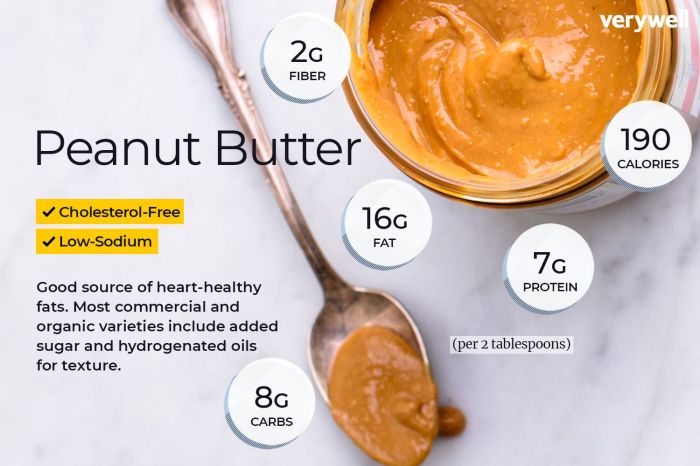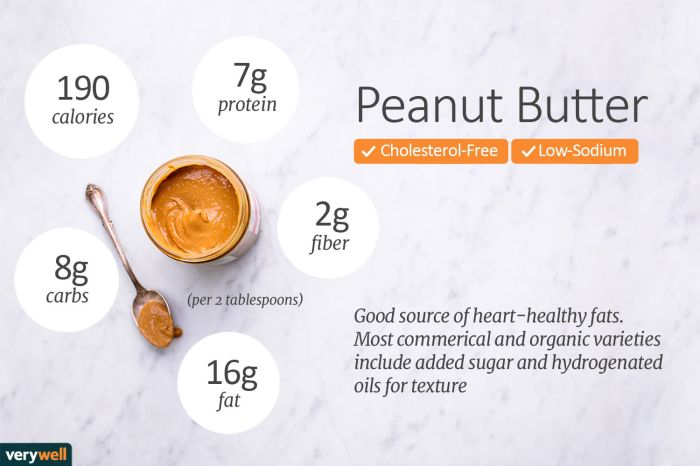Peanut Butter and Calorie Intake

Nutrition facts about peanut butter m – Peanut butter is a popular and convenient food, but its calorie density can significantly impact weight management. Understanding the calorie content of different types of peanut butter and its effects on your diet is crucial for making informed choices. This section will explore the calorie content of various peanut butter options and discuss their role in both weight loss and weight gain strategies.
Peanut butter is relatively calorie-dense. A typical serving size, often considered to be two tablespoons (approximately 32 grams), contains a substantial amount of calories. The exact number varies depending on the type of peanut butter and any added ingredients, such as sugar or salt. This high calorie density can be beneficial for those aiming to gain weight, but it requires careful consideration for individuals aiming for weight loss.
Calorie Content of Different Peanut Butter Types, Nutrition facts about peanut butter m
The calorie count in peanut butter varies based on several factors, including the type (smooth, crunchy, natural, reduced-fat), brand, and added ingredients. The following table provides a general comparison. Note that these are approximate values and may differ slightly based on the specific product.
Understanding the nutrition facts about peanut butter, particularly its fat and protein content, is crucial for a balanced diet. It’s interesting to note that the fermentation process, often involving bacteria that produce lactic acid, plays a role in some food preparations. For a deeper understanding of lactic acid’s role in food, you can check out this informative resource on lactic acid definition food and nutrition facts.
Returning to peanut butter, its nutritional profile also includes essential vitamins and minerals, making it a versatile addition to a healthy eating plan.
| Type | Calories per Serving (2 tbsp) | Fat Content (per serving) | Added Sugar (per serving) |
|---|---|---|---|
| Smooth Peanut Butter | 190-200 | 16-18g | 0-2g |
| Crunchy Peanut Butter | 190-210 | 16-19g | 0-2g |
| Natural Peanut Butter (no added sugar or salt) | 190-200 | 16-18g | 0g |
| Reduced-Fat Peanut Butter | 160-180 | 9-12g | 1-4g (often higher due to added sugar to compensate for taste) |
Peanut Butter and Weight Loss
While peanut butter’s high calorie content might seem counterintuitive for weight loss, it can actually be incorporated into a healthy weight-loss diet. Its high protein and fiber content contribute to satiety, helping to reduce overall calorie intake throughout the day. Choosing natural peanut butter with no added sugar and limiting portion sizes is key. For example, incorporating a small amount of peanut butter into a balanced breakfast or as a snack can help curb cravings and prevent overeating later in the day.
However, excessive consumption can hinder weight loss efforts.
Peanut Butter and Weight Gain
For individuals aiming to gain weight, peanut butter’s high calorie and fat content can be advantageous. Its healthy fats and protein provide the necessary calories to support muscle growth and overall weight gain. Adding peanut butter to smoothies, oatmeal, or using it as a spread on whole-wheat toast can increase daily caloric intake effectively. However, it’s important to combine this with a balanced diet and regular exercise to ensure healthy weight gain and avoid excessive fat storage.
Peanut Butter and Health Benefits: Nutrition Facts About Peanut Butter M

Peanut butter, a beloved spread enjoyed worldwide, offers a surprising array of health benefits beyond its delicious taste. Regular consumption, as part of a balanced diet, has been linked to improved cardiovascular health, better blood sugar control, and a reduced risk of certain chronic diseases. This stems from its unique nutritional composition, rich in healthy fats, protein, fiber, and essential vitamins and minerals.
The health benefits of peanut butter are primarily attributed to its rich composition. Monounsaturated and polyunsaturated fats, the “good” fats, constitute a significant portion of its fat content. These fats contribute to lowering LDL (“bad”) cholesterol levels and raising HDL (“good”) cholesterol levels, thereby supporting heart health. Furthermore, peanut butter is a good source of dietary fiber, which aids digestion, promotes satiety, and helps regulate blood sugar levels.
The protein content in peanut butter contributes to building and repairing tissues, while various antioxidants, such as vitamin E and resveratrol, combat oxidative stress and protect cells from damage. These combined effects contribute to the overall health benefits.
Nutritional Comparison of Nut Butters
While peanut butter stands out, it’s beneficial to compare its nutritional profile with other popular nut butters to understand their relative strengths and weaknesses. The following table presents a comparison of protein, fat, and fiber content (values are approximate and can vary based on brand and processing methods). It’s important to note that all nut butters offer unique nutritional advantages, and the best choice depends on individual dietary needs and preferences.
| Nut Butter Type | Protein (g/2 tablespoons) | Fat (g/2 tablespoons) | Fiber (g/2 tablespoons) |
|---|---|---|---|
| Peanut Butter | 7-8 | 16-19 | 2-3 |
| Almond Butter | 6-7 | 14-16 | 2-3 |
| Cashew Butter | 5-6 | 12-14 | 1-2 |
General Inquiries
Is peanut butter good for people with diabetes?
Peanut butter can be part of a diabetic diet, but portion control is crucial due to its carbohydrate content. Opt for natural varieties with no added sugar and monitor blood sugar levels after consumption.
Can peanut butter cause weight gain?
While calorie-dense, peanut butter can aid in weight management when consumed in moderation as part of a balanced diet. Its protein and fiber content promote satiety.
Are there any potential allergies associated with peanut butter?
Peanut allergies are common and can be severe. Individuals with peanut allergies must strictly avoid peanut butter and products containing peanuts.
How long does peanut butter last?
Properly stored peanut butter (in a cool, dry place) typically lasts for several months past its “best by” date. Check for signs of rancidity (off-odor or taste) before consumption.
